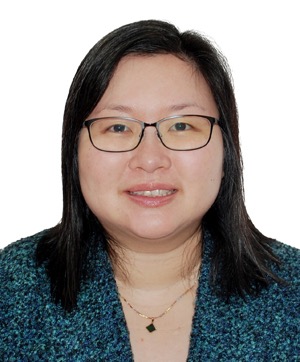Faculty

Helene Hoi-Lam FUNG
Website:
·Ph.D. in Psychology, Stanford University, USA in June, 2000
·M.A. in Psychology, Stanford University, USA in March, 1997
·B.Sc. with college honors in Psychology, University of Washington, USA in June, 1995
Chairperson & Professor
Rm 332, Chen Kou Bun Building
hhlfung@psy.cuhk.edu.hk
3943 6464
2603 5019
Motivation and Emotion Laboratory
Teaching Areas
- PSYC6300- Writing and Presentation
Research Interests
Studying how goals change across adulthood, and their impacts on social relationships, emotional regulation, and cognition.
I study emotion, social relationships and cognition regarding age and aging. The world's population is aging. In Hong Kong, the average life expectancy for men is 82 years and that of women is 85 years. We know much less about the last 30 years of life than we know about the first 5. All these arouse my interests in studying ageing, and how older adults are valuable resources to the society.
Publications
Chu, L., & *Fung, H. H. (2022). Age Differences in State Curiosity: Examining the Role of Personal Relevance. Gerontology, 68, 321-329. https://doi.org/10.1159/000516296
Chu, L., Tsai, J. L., & *Fung, H. H. (2021). Association between age and intellectual curiosity: The mediating roles of future time perspective and importance of curiosity. European Journal of Ageing, 18(1), 45–53. https://doi.org/10.1007/S10433-020-00567-6
Chu, L.,*Fung, H. H., Tse, D. C. K., Tsang, V. H. L., Zhang, H., & Mai, C. (2021). Obtaining Information from Different Sources Matters During the COVID-19 Pandemic. The Gerontologist, 61(2), 187-195. https://doi.org/10.1093/geront/gnaa222
Chu, S. T. W., & *Fung, H. H. (2021). Is the Search for Meaning Related to the Presence of Meaning? Moderators of the Longitudinal Relationship. Journal of Happiness Studies, 22, 127–145. doi: 10.1007/s10902-020-00222-y
*Fung, H. H., Lu, M., & Ho, O. T., (2019). The Role of Instrumentality of Emotion in the Age-related Positivity Effect. Emotion. doi: 10.1037/EMO0000696
*Fung, H. H., Lu, M., Isaacowitz, D. M. (2019). Aging and attention: Meaningfulness may be more important than valence. Psychology and Aging, 34(1), 85-90. doi:10.1037/PAG0000304
*Fung, H. H., Ho, Y. W., Zhang, R., Zhang, X., Noels, K. A., & Tam, K-P., (2016). Age differences in personal values: Universal or cultural specific? Psychology and Aging, 31, 274–286. doi: 10.1037/PAG0000082
*Fung, H. H. (2013). Aging in Culture. The Gerontologist, 53(3), 369-377. doi: 10.1093/GERONT/GNT024
Zhang, X., *Fung, H. H., Stanley, J., Isaacowtiz, D. M., & Ho, M. Y. (2013). Perspective taking in older age revisited: A motivational perspective. Developmental Psychology, 49, 1848-1858. doi: 10.1037/A0031211
*Fung, H. H., Isaacowitz , D. M., Lu, A. Y., & Li, T. (2010) Interdependent self-construal
moderates the age-related negativity reduction effect in memory and visual attention. Psychology and Aging, 25(2), 321-329. doi: 10.1037/A0019079
*Fung, H. H., Yeung, D. Y., Li, K-K, & Lang, F. R. (2009). Benefits of Negative social exchange increases for emotional closeness. Journal of Gerontology: Psychological Sciences, 64B, 612-621.
*Fung, H. H., Isaacowitz, D. M., Lu, A., Wadliinger, H. A., Goren, D., & Wilson, H. r. (2008). Age-related positivity enhancement is not universal: Older Hong Kong Chinese look away from positive stimuli. Psychology and Aging, 23, 440-446.
*Fung, H. H., Stoeber, f. S., Yeung, D. Y., & Lang, F. R. (2008). Cultural specificity of socioemotional selectivity: Age differences in social network composition among Germans and Hong Kong Chinese. Journal of Gerontology: Psychological Sciences, 63B, 156-164.
Yeung, D. Y., *Fung, H. H., & Lang, F. R. (2008). Self-construal moderates age differences in social network characteristics. Psychology and Aging, 23, 222-226.
*Fung, H. H., & Ng, S. K. (2006). Age differences in the sixth personality factor: Age Differences in Interpersonal Relatedness Among Canadians and Hong Kong Chinese. Psychology and Aging, 21, 810-814.
*Fung, H. H., & Carstensen, L. L. (2006). Goals change when life's fragility is primed: Lessons learned from Older Adults, the September 11th Attacks and SARS. Social Cognition, 24, 248-278.
Honors and Awards
- Fellow, Gerontological Society of America (2011)
- Margret M. Baltes Early Career Award in Behavioral and Social Gerontology, The Gerontological Society of America (2010)
- Fellow, Association for Psychological Science (2010)
- Retirement Research Foundation Mentor Award, American Psychological Association (Div 20)(2008)
- Exemplary Teaching Award, Faculty of Social Science, Chinese University of Hong Kong (2007)
- Young Researcher Award, The Chinese University of Hong Kong (2006)
- Behavioral and Social Science Pre-dissertation Research Award, The Gerontological Society of America (1999)
- Margaret Clark Paper Award, The Association of Anthropology and Gerontology (1998)




